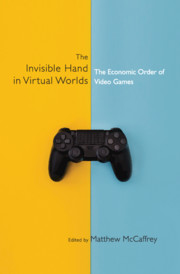Book contents
- Frontmatter
- Contents
- Introduction
- 1 The Economic Meaning of Play: Ludology and Praxeology in Video Game Worlds
- 2 Spontaneous Order and Video Game Narrative
- 3 Law and Economics in a World of Dragons
- 4 Minerals, Titans, and Connections: The Political Economy of Empire in the World of EVE Online
- 5 The Origins of Money in Diablo II
- 6 A Virtual Weimar: Hyperinflation in Diablo III
- 7 The Facilitate or Acquire Decision: The Tipping Points for Strategies toward User-Generated Content in Massively Multiplayer Online Game Platforms
- 8 Mod the World: How Entrepreneurs Learn from Video Game “Modding” Communities
- 9 Levels without Bosses? Entrepreneurship and Valve's Organizational Design
- About the Contributors
- Index
2 - Spontaneous Order and Video Game Narrative
Published online by Cambridge University Press: 31 July 2021
- Frontmatter
- Contents
- Introduction
- 1 The Economic Meaning of Play: Ludology and Praxeology in Video Game Worlds
- 2 Spontaneous Order and Video Game Narrative
- 3 Law and Economics in a World of Dragons
- 4 Minerals, Titans, and Connections: The Political Economy of Empire in the World of EVE Online
- 5 The Origins of Money in Diablo II
- 6 A Virtual Weimar: Hyperinflation in Diablo III
- 7 The Facilitate or Acquire Decision: The Tipping Points for Strategies toward User-Generated Content in Massively Multiplayer Online Game Platforms
- 8 Mod the World: How Entrepreneurs Learn from Video Game “Modding” Communities
- 9 Levels without Bosses? Entrepreneurship and Valve's Organizational Design
- About the Contributors
- Index
Summary
In myth and ritual the great instinctive forces of civilized life have their origin: law and order, commerce and profit, craft and art, poetry, wisdom and science. All are rooted in the primeval soil of play.
—Johan Huizinga, Homo Ludens: A Study of the Play Element in CultureA game is indeed a clear instance of a process wherein obedience to common rules by elements pursuing different and even conflicting purposes results in overall order.
—F. A. Hayek, The Fatal ConceitConsider the practice of storytelling—a deliberate human contrivance where a storyteller consciously guides the listener through a series of events, introducing characters and places, usually with the intent to convey a moral lesson or elicit certain thoughts and emotions. In many stories, especially in more traditional media such as novels and films, the design of the narrative is paramount because it is the only explicit source of the audience's knowledge. Seen in this light, video games provide a fascinating case study of spontaneous orders in narrative: players possess a unique ability to interact with the game space, the game's creators, and other players, and this can fundamentally change how stories are created and experienced. Even in cases where consciously designed stories exist, the narrative that instead arises out of player actions and interactions is often the more interesting and enduring one for gamers themselves. In this chapter, I explore the idea of spontaneous order in games. I argue that early video games had mostly spontaneous narratives due to hardware and software limitations; however, this emergent quality was gradually replaced with more structured, on-rails narratives of increasing complexity. Nevertheless, in the past decade especially, there has been a resurgence of interest in the spontaneous generation of narratives, which many argue provides a nearly infinite richness not achievable through conventional story structures. More spontaneous games create “stories” that, as Adam Ferguson said of spontaneous order in general, are the “result of human action, but not the execution of any human design.” I also argue that the video game medium is particularly well suited to this kind of interactive storytelling, giving it a unique place among artistic media.
SPONTANEOUS ORDER?
Among Adam Smith's many contributions to economics is the idea of market participants being led “as if by an invisible hand” to increase the welfare of all members of society (Smith, 1776; Rothschild, 1994).
- Type
- Chapter
- Information
- The Invisible Hand in Virtual WorldsThe Economic Order of Video Games, pp. 37 - 46Publisher: Cambridge University PressPrint publication year: 2021



